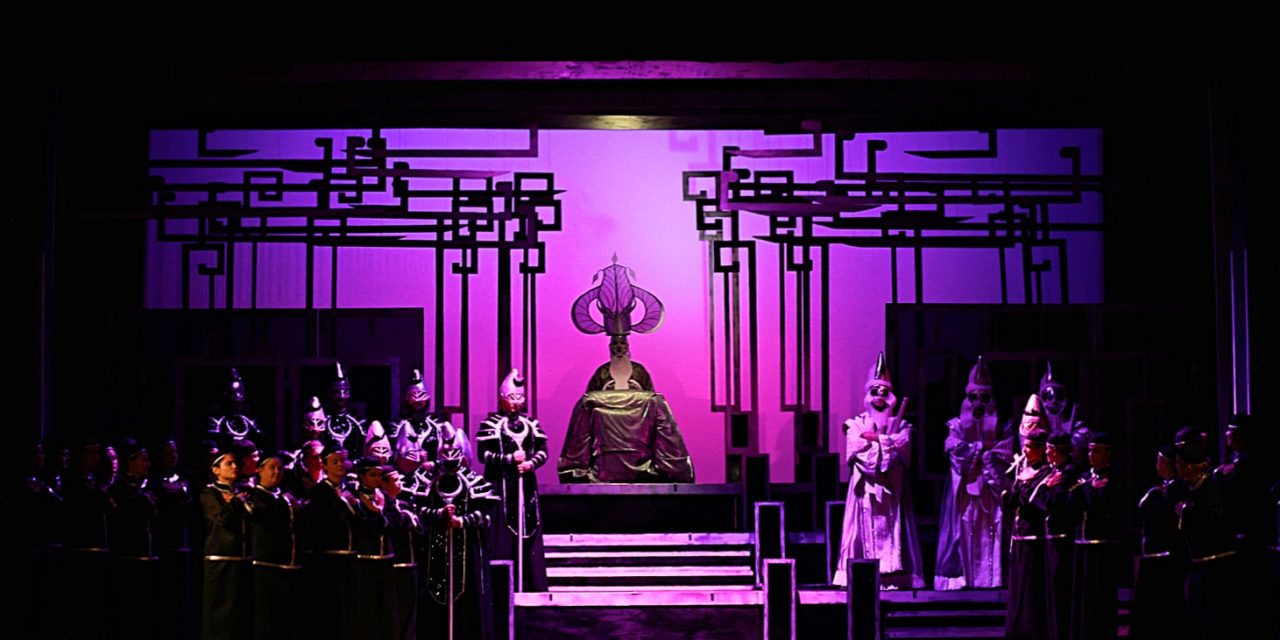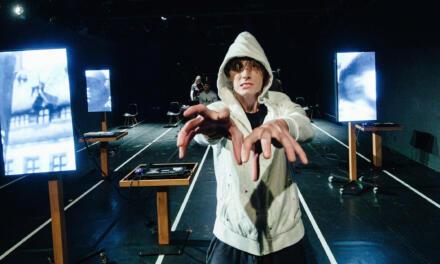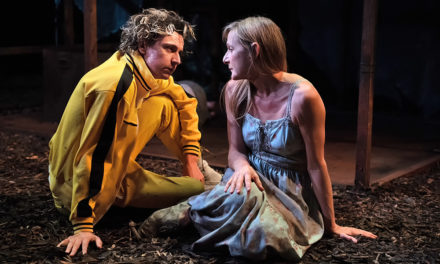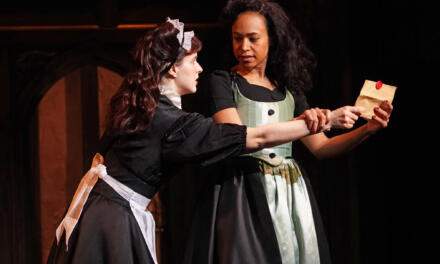In 2018, the Nae Leonard Teatrul Muzical in Galati, Romania, was declared the National Opera Theatre, and this prestigious result was celebrated with the staging–in three acts–of Turandot, by Giacomo Puccini (1858–1924), with an Italian libretto by Giuseppe Adami (1878–1946) and Renato Simoni (1875–1952). For this special occasion, particularly appreciated is the work of Professor Paolo Bosisio as opera director, considering also his deep academic knowledge of Carlo Gozzi (1720–1806) and his tales for the theatre, which inspired the story of the princess Turandot.
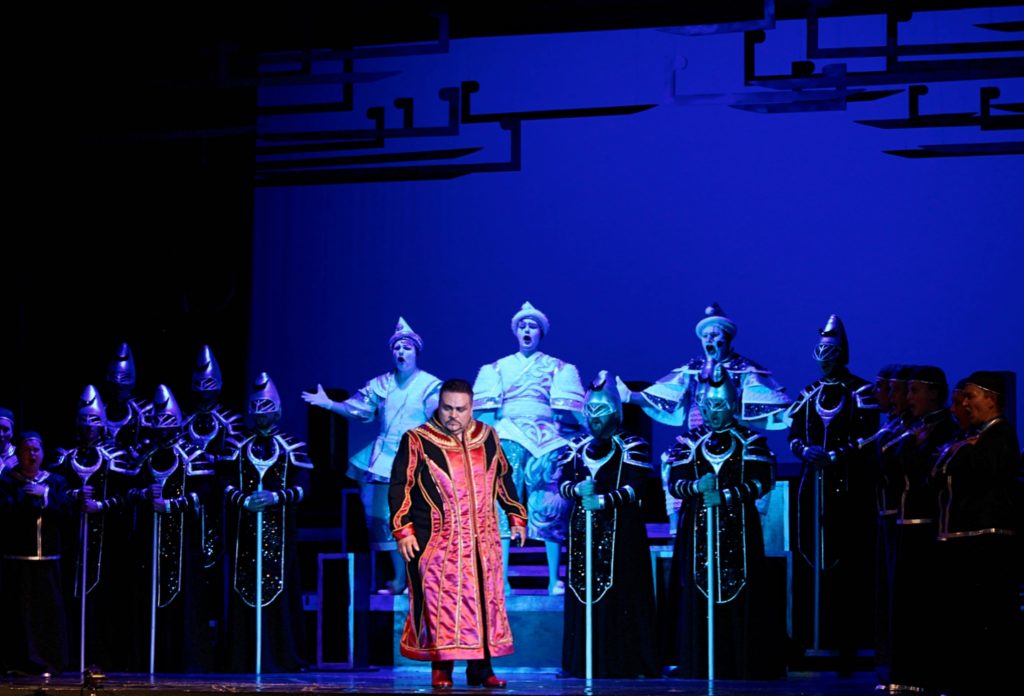
Turandot. Staging at the Nae Leonard Teatrul Muzical in Galati, Romania, 2018, opera director Paolo Bosisio. Press photo.
One year ago, Professor Bosisio conquered Romanian audiences with the debut of Verdi’s A Masked Ball (Un Ballo In Maschera) at the Galati Theatre Festival. This new success is due to his artistic genius and to his original interpretation of the plot for Puccini’s Turandot: in fact, he did not consider as primary elements the love story and Orientalism but rather the characters’ inner struggles. From a psychological point of view, the princess Turandot is a victim of an ancestral trauma, and her prejudices against men reflect her family’s past. She is alone, and she is the only heir of the empire. Her father prefers to have a male descendant, but she refuses the law of men and marriage: for this reason, she has invented the trick of the three riddles, and all her noble suitors have died in the vain hopes of winning her hand.
But the boldness of the foreign prince Calaf is winning: even though he was dissuaded from the competition, he makes three guesses, securing a chance to marry the princess Turandot. At the beginning of the story, Calaf has an aversion to the cruelty of the beautiful girl, who has no pity for her victims and their capital sentence. Falling in love with her, he risks his life and–despite all appearances–triumphs. Obviously, Turandot is astonished and reluctant: she promises hate and revenge, while her father wants to pay this debt of honor to Calaf.
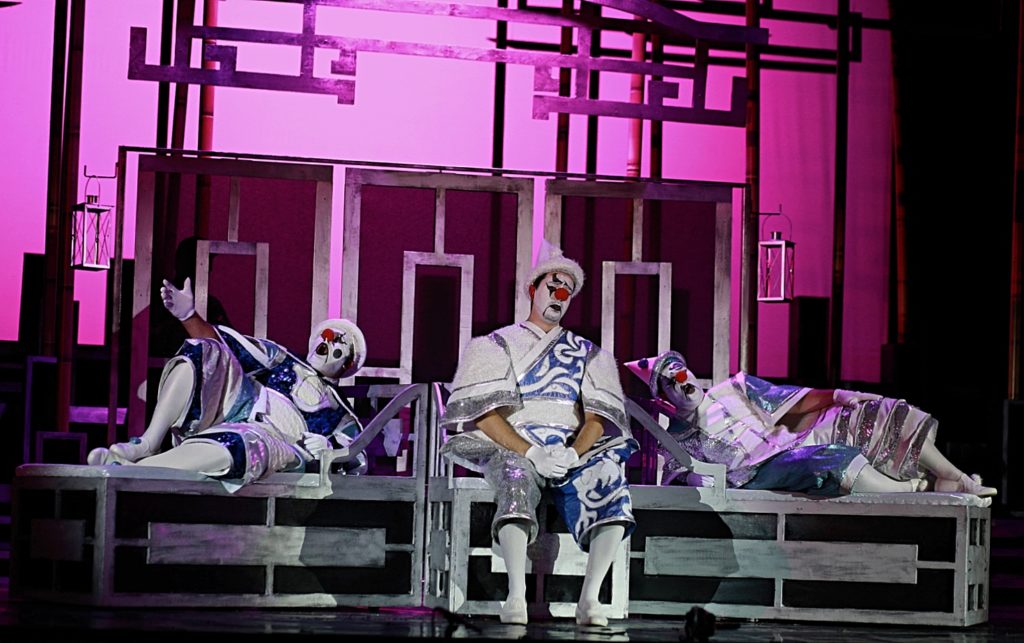
Turandot. Staging at the Nae Leonard Teatrul Muzical in Galati, Romania, 2018, opera director Paolo Bosisio. Press photo.
Again from the psychological point of view, Calaf seems to act with imprudence and a total lack of control: he challenges the imperious Turandot again, asking her to discover his mysterious name. Like many heroes of the melodramatic tradition, he seems to be an irresponsible and foolish guy in search of adventure: in reality, he promises the gift of his life to the beautiful princess. He is a winner, but he does not hesitate to risk again, because he feels great pleasure in such situations.
Turandot’s arrogance and Calaf’s daring are counterbalanced by the humanity of Timur (Calaf’s old, blind father) and his faithful servant Liù. The tragic element of the story is linked to the death of Liù, who declares that she alone knows the name of the foreign prince. She is tortured again and again but resists: she secretly loves Calaf and kills herself, without revealing his name. Liù’s supreme sacrifice makes possible the final reunion between Calaf and Turandot because the princess is led to admit her love since their first meeting. Placing his life in Turandot’s hands again, Calaf reveals his name, but she does not want to destroy him: in front of her father and the people, she declares their mutual love.
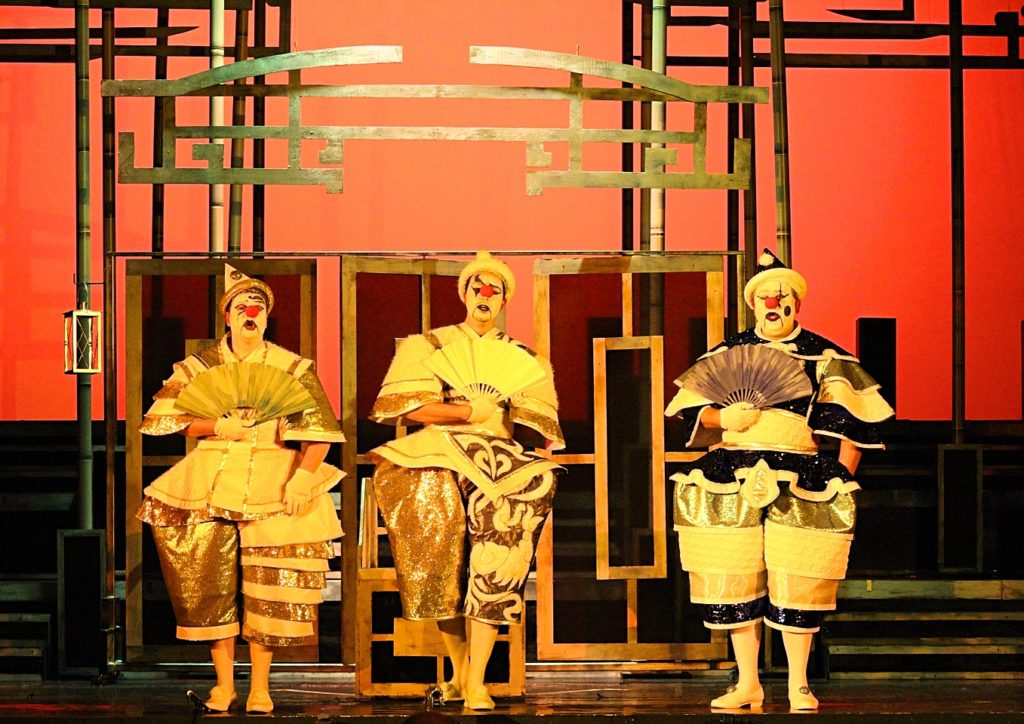
Turandot. Staging at the Nae Leonard Teatrul Muzical in Galati, Romania, 2018, opera director Paolo Bosisio. Press photo.
The conductor Gheorghe Stanciu and the orchestra of the Nae Leonard Teatrul Muzical emphasized the deep emotional impact of this staging, increasing the characters’ psychological dimensions. The use of lighting was also functional to the different feelings of the characters, creating a perfect synergy with the work of the costume and set designer Domenico Franchi: in particular, the silver cage of Turandot alludes to her condition as a young and noble woman who lives her destiny of solitude, in a sort of prison, because of her unfortunate ancestral heritage. The spell is broken by the brave Calaf and the devoted Liù, while the realistic and comic dimension is underlined by the three ministers, Ping, Pong, and Pang–a mixture, in their performance, of the clownish tradition and the Commedia dell’Arte.
The dramatic interpretation of the singing company was truly appreciated, with the soprano Olga Hristea-Stan, in the role of Turandot, and the Italian tenor Antonino Interisano, who has long experience in the role of Calaf. The soprano Young Ju Kim offered a touching and refined performance in the role of Liù, perfect as both singer and actress. The bass-baritone Dominic Cristea with the tenors Adrian Ionescu and Tudor State offered innovative interpretations as the three ministers.
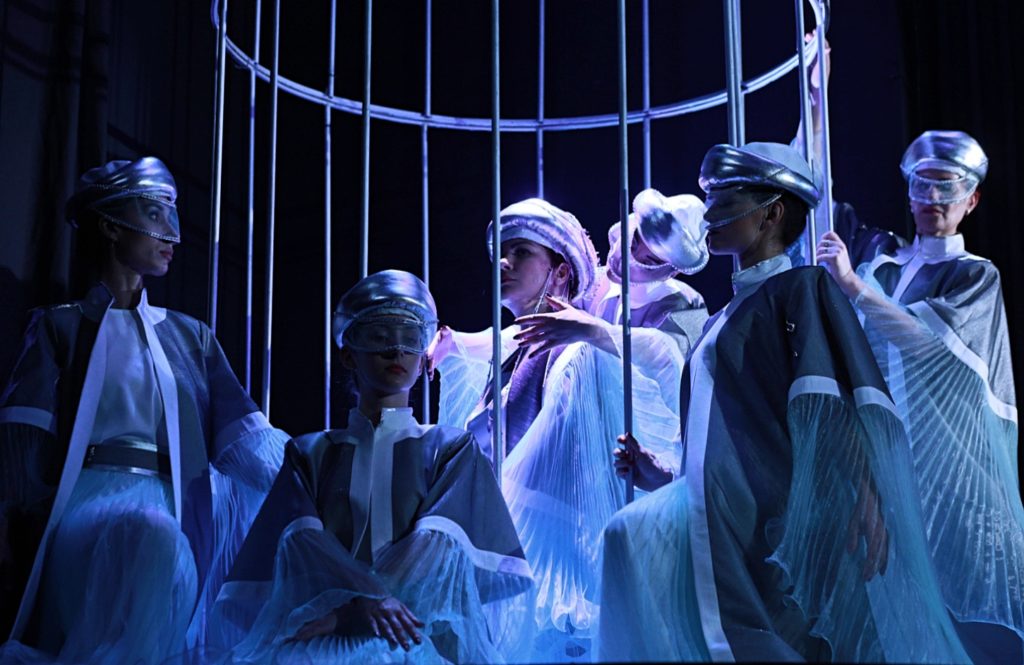
Turandot. Staging at the Nae Leonard Teatrul Muzical in Galati, Romania, 2018, opera director Paolo Bosisio. Press photo.
With this notable production, Professor Bosisio confirms his leading position as opera director in Eastern Europe. His great ability to work with artists from different countries–from Romania to South Korea to Italy–is related to his long artistic experience, which is the most precious gift for audiences.
Turandot debuted on June 22, 2018, and was staged again on October 6, 2018. for the inauguration of the Nae Leonard International Festival in Galati, Romania. It will remain in the theatre’s repertoire, with two stagings each year.
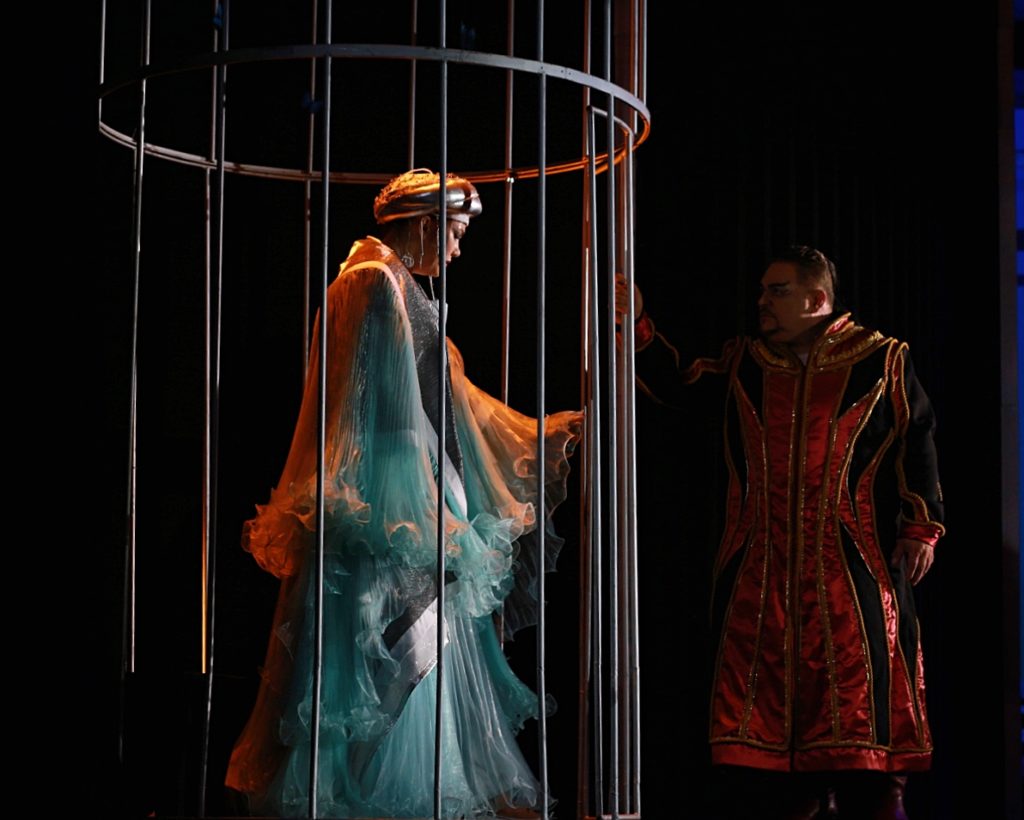
Turandot. Staging at the Nae Leonard Teatrul Muzical in Galati, Romania, 2018, opera director Paolo Bosisio. Press photo.
This post was written by the author in their personal capacity.The opinions expressed in this article are the author’s own and do not reflect the view of The Theatre Times, their staff or collaborators.
This post was written by Maria Pia Pagani.
The views expressed here belong to the author and do not necessarily reflect our views and opinions.

